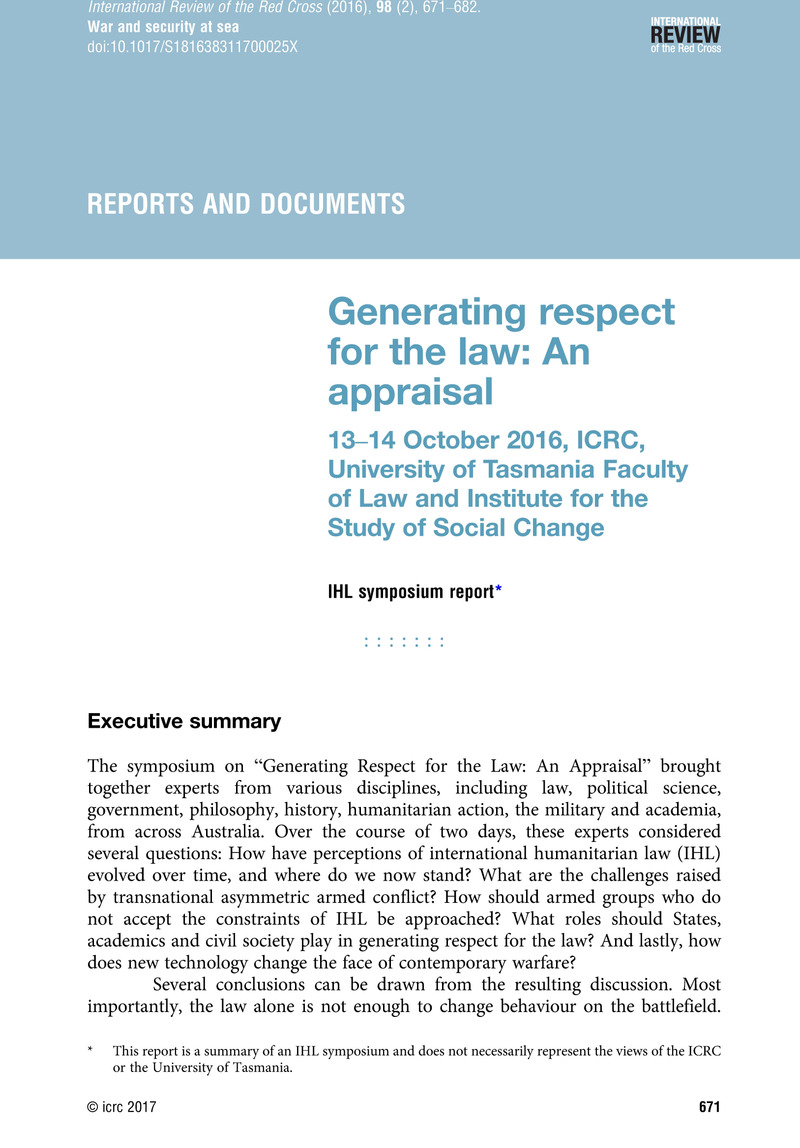No CrossRef data available.
Article contents
Generating respect for the law: An appraisal
13–14 October 2016, ICRC, University of Tasmania Faculty of Law and Institute for the Study of Social Change
Published online by Cambridge University Press: 04 July 2017
Abstract

- Type
- Reports and documents
- Information
- International Review of the Red Cross , Volume 98 , Issue 902: War and security at sea , August 2016 , pp. 671 - 682
- Copyright
- Copyright © icrc 2017
Footnotes
This report is a summary of an IHL symposium and does not necessarily represent the views of the ICRC or the University of Tasmania.
References
1 Special thanks to Hannah Salisbury, for her note-taking, and to Netta Goussac and Ellen Policinski for their work in preparing this report.
2 ICC, The Prosecutor v. Jean-Pierre Bemba Gombo, Case No. ICC-01/05-01/08, 21 March 2016.
3 See Sassòli, Marco, “Introducing a Sliding-Scale of Obligations to Address the Fundamental Inequality between Armed Groups and States?”, International Review of the Red Cross, Vol. 93, No. 882, 2011Google Scholar. Compare with Shany, Yuval, “A Rebuttal to Marco Sassòli”, International Review of the Red Cross, Vol. 93, No. 882, 2011Google Scholar. See also Provost, Rene, “The Move to Substantive Equality in International Humanitarian Law: A Rejoinder to Marco Sassòli and Yuval Shany”, International Review of the Red Cross, Vol. 93, No. 882, 2011Google Scholar.
4 Report of the Working Group on the Use of Mercenaries as a Means of Violating Human Rights and Impeding the Exercise of the Right of Self-Determination, UN Doc. A/HRC/15/25, 2 July 2010, Annex.
5 Montreux Document on Pertinent International Legal Obligations and Good Practices for States Related to Operations of Private Military and Security Companies During Armed Conflict, Montreux, 17 September 2008.
6 See “The Roots of Behavior in War Revisited”, video, available at: www.icrc.org/en/event/roots-behaviour-war-revisited (accessed in January 2017).
7 See Koh, Harold, “Why Do Nations Obey International Law?”, Yale Law Journal, Vol. 106, No. 1, 1996Google Scholar.
8 See, for example, the San Remo Manual, Harvard Manual, Tallinn Manual, Manual on International Law Applicable to Military Uses of Outer Space, and Copenhagen Principles, as well as the ICRC's Interpretive Guidance on Direct Participation in Hostilities and the Commentary to the Geneva Conventions.
9 See, for example, the Humanitarian Leadership Programme offered by Deakin University, Australia.
10 UK Supreme Court, Smith et al. (No. 2) v. Ministry of Defence, UKSC 41, 19 June 2013.




